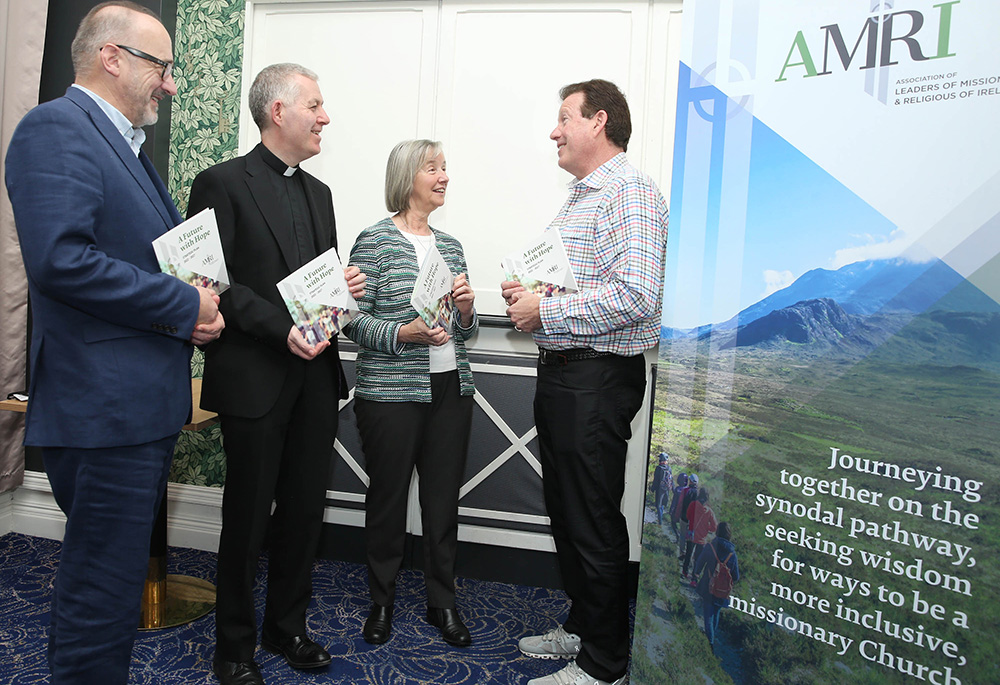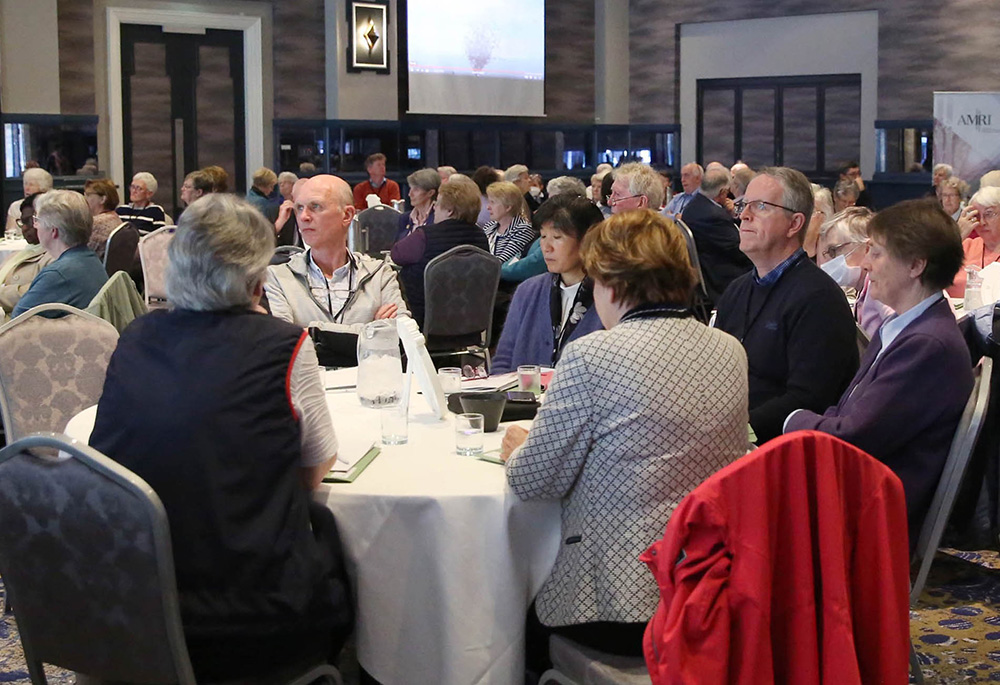
Members of the leadership team of the Association of Leaders of Missionaries and Religious of Ireland, from left: David Rose, secretary general; Abbot Brendan Coffey, president; Sr. Mary Hanrahan of the Sisters of the Presentation of the Blessed Virgin Mary; and Ted Dunn. Dunn was keynote speaker Sept. 29 at an AMRI gathering in Tullamore, Ireland, attended by almost 200 religious sisters, brothers and priests from leadership teams of 155 religious and missionary congregations in Ireland. At the gathering, AMRI launched a new 5-year strategic plan. (Courtesy of AMRI)
Women religious in Ireland told officials for the upcoming Synod of Bishops on synodality that they feel resigned to and hurt from the "constant battering" from the media, which has used them "as scapegoats for Irish church and society."
In their submission to the synod as part of the Irish national synthesis of the synodal process published Aug. 16, women religious in Ireland lamented their invisibility and highlighted their sense of marginalization. They said religious life in Ireland has been given a lot of bad press, with a particular focus on the past.
"There is a sense of being silenced, but silence is seen as condoning the accusations and giving an impression that 'we're all guilty'. We are partly to blame for our own invisibility as we appear to have gone underground," they wrote.
They likened the negative coverage to "a niggling sore" and say it is difficult for them to counter the way they are presented in the media, as "any religious who speaks up would be shut down."
The release of the Ryan Report in 2009, which investigated child abuse in residential institutions or industrial schools operated by religious orders, was "very difficult," the sisters write, adding that the recent report on mother and baby homes has been similarly painful for all involved.
"Despite the reports demonstrating that Irish society as a whole was culpable, the focus has remained on women religious," they wrote.
Sr. Kathleen McGarvey, provincial of the Missionary Sisters of Our Lady of Apostles in Ireland and former president of the Association of Leaders of Missionaries and Religious of Ireland, or AMRI, told Global Sisters Report that the synod submission was drafted by AMRI's synod working group of one religious brother, two religious sisters, one laywoman and one layman.
The submission, "Experience and Dreams as Religious Women in the Catholic Church in Ireland," draws on a report prepared from conversations held between women religious from May to August 2021, which followed a dialogue between the Irish church's four archbishops and AMRI officers regarding the hurt, pain and marginalization that religious women in the Irish church sometimes expressed.
In their submission, the sisters said the institutional church has enjoyed "the glory of the schools and education" that they provided. Yet when new ways of serving the church through new ministries or the letting-go of religious schools and hospitals had to be found because of declining numbers, the hierarchy "tended to withdraw, disassociate or rely on 'delay tactics', refusing to respond to or dialogue with religious orders to look at change and move on with the times."
"As women religious in Ireland, we are no longer in leadership roles in the Church: i.e. through schools and hospitals. We are in the background, and while this is a little intimidating and can be painful, we realise a lot of 'letting go' must take place," they wrote. "We also realise that this is a healthy reminder that our identity was linked too much to what we did. We need to grow into the realisation that we are 'contemplatives in action' and the importance of our self-identity as women Religious, not just our working function."

A gathering of Association of Leaders of Missionaries and Religious of Ireland in Tullamore, Ireland, was attended by almost 200 religious sisters, brothers and priests from leadership teams of 155 religious and missionary congregations in Ireland. At the gathering, AMRI launched a new 5-year strategic plan. AMRI's synod working group of one religious brother, two religious sisters, one laywoman and one layman drafted the synod submission for Irish women religious. (Courtesy of AMRI)
The document spells out ways sisters have felt excluded within the Irish church. At the parish level, it highlights how many members of the clergy are closed to creativity and can be resistant to or refuse change.
"This limits those within the parish structures such as the parish council, parish planning group, liturgy group, diocesan planning group, etc., who have unique gifts to offer to support the parish, in particular women religious," the document says.
Members of the clergy, the sisters note, are not trained or accustomed to working as a team. The result is that religious and clergy simply create spaces to work alongside each other rather than working together.
"There must be space and dialogue to move forward together — but what does together look like?" they ask, highlighting how women religious' way of decision-making is inclusive and synodal, involving a high level of participation.
On the issue of exclusion at the sacramental level, the authors noted that women can only experience six of the seven sacraments. When the role of deacon was added, this was limited to married men and excluded women.
"Women religious are uniquely qualified and experienced to conduct this role, yet another layer was added to exclude them," the document says. "Whether women religious would be open to this role or not is irrelevant in the absence of a choice."
The sisters also regret the continued use of exclusive language in the church, especially in liturgical celebrations — for example, "for us 'men' and for our salvation."
Advertisement
McGarvey said members of the church need to have many conversations about the ordained priesthood, religious life, the lay faithful, mission, and being church.
"All of us have a responsibility to speak, to give positive and constructive criticism, with a view to improvement," she said. "That is what the women religious of Ireland have tried to do."
The synod "is giving us that opportunity, and it is important we all avail of it," she said. "I think there is also a need for conversations in Ireland on faith and society: the role of faith in the public square, the interaction of faith and public policy."
On the ongoing conversations between women religious and the Irish bishops, she said the sharing had shown it was "not only the religious who are hurt" and that the massive change in the culture — secularization, decline in religious practice, and the negative reaction to religious in the wake of the reports into religious-run institutions — "leaves us all disoriented."
"In sharing our hopes and vision for the church, it is clear that both bishops and women religious, as well as many other lay and religious women and men, feel called to discover and follow the pathway toward a more equal and collaborative way of being church," McGarvey said.
One of the questions some of the sisters raised was whether the synod is worth investing energy into.
"We haven't been heard in the past and have found other ways of belonging within the institution," McGarvey said. "Will we be hurt again if we invest our energy into it?"
However, she said making a submission to the synod is one way of trying to ensure they are heard.
"Women religious have many good stories to tell about the past as well as the present, but none of these make the news," she said. "The media looks to the bishops as church leaders but forgets that the church has many leaders, including laypeople and religious. These are not given voice."








